Sikh News
Disappeared, Denied but not Forgotten: Independent People’s Tribunal hears to testimonies of kins of Victims of Enforced Disappearances in Punjab
April 1, 2017 | By Sikh Siyasat Bureau
Amritsar: The Punjab Documentation and Advocacy Project (PDAP) in collaboration with Human Rights Law Network, Committee for Co-ordination on Disappearances in Punjab, Lawyers for Human Rights International, the Punjab Human Rights Organisation, Khalra Mission Organisation, Sikhs for Human Rights and many other NGO’s and activists are holding a two-day Independent People’s Tribunal (IPT) on the issues of enforced disappearances, fake encounters and two decades of the denial of justice and accountability in Punjab.
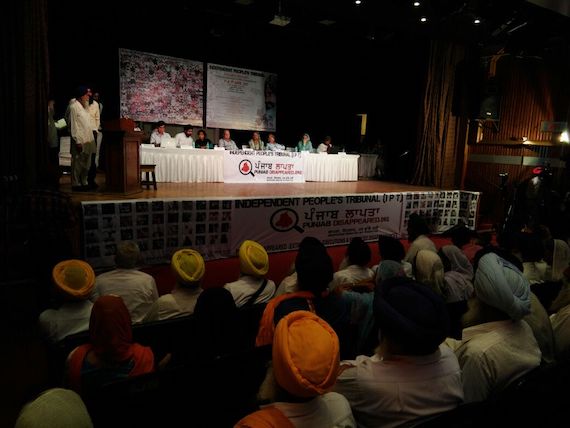
Kins of victims of Enforces Disappearances in Punjab deposing before Independent People’s Tribune in Amritsar | Photo: Jasbir Singh
The IPT today heard testimonies of hundreds of forgotten victims whose loved ones were disappeared and many of whom were cremated as “unclaimed and unidentified” by the Punjab Police in 22 of Punjab’s districts.
A release issued the organizers states that [t]he Tribunal will provide a unique insight into the practice of disappearances and extra-judicial killings by taking a victim based approach, offering a platform for the victims to depose before the panel their experiences.
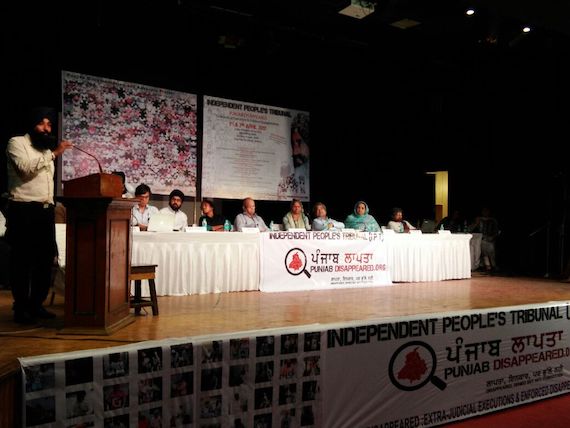
Independent People’s Tribune sits in Amritsar to hear cases related to enforced disappearances in Punjab | Photo: Jasbir Singh
The IPT will also hear experiences of lawyers, activists and NGO’s who have pursued cases and struggled for justice and accountability in Punjab.
The IPT panel which held the proceeds today at Amritsar comprised Justice A K Ganguly (Retired Judge Supreme Court of India & Former Chairman of the West Bengal Human Rights Commission), Justice Suresh (Retired Judge, Bombay High Court), Colin Gonsalves (Senior Supreme Court Lawyer & Director, Human Rights Law Network), Bibi Paramjit Kaur Khalra (KMO, Wife of Jaswant Singh Khalra), Kavita Srivastava (National Convener, People’s Union for Civil Liberties), Soni Sori (Tribal Activist & Human Rights Defender, Chattisgarh), Tapan Bose (Secretary General of South Asia Forum for Human Rights and documentary film maker) and Parveena Ahanger (Chairperson of Association of Parents of Disappeared Persons, Kashmir).
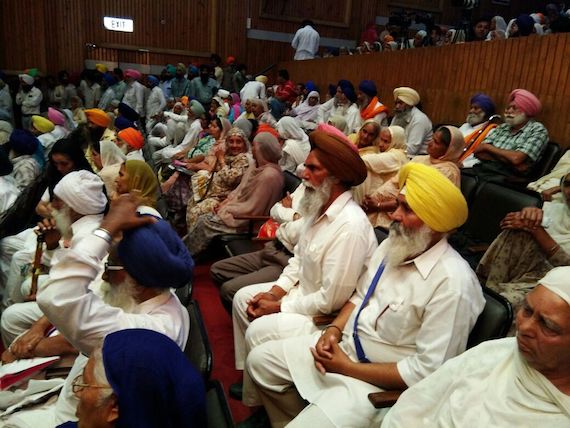
Family members of victims of enforced disappearances in Punjab attending the proceedings | Photo: Jasbir Singh
The Punjab mass disappearances during the Punjab conflict have not received the importance and attention they deserve. An overwhelming number of victim’s voices have never been heard in the public domain. The majority have been awaiting basic acknowledgement, accountability and redress. In a tiny minority of cases, which could be pursued through the Courts, the victims have been grounded down by the endless facades of litigation.
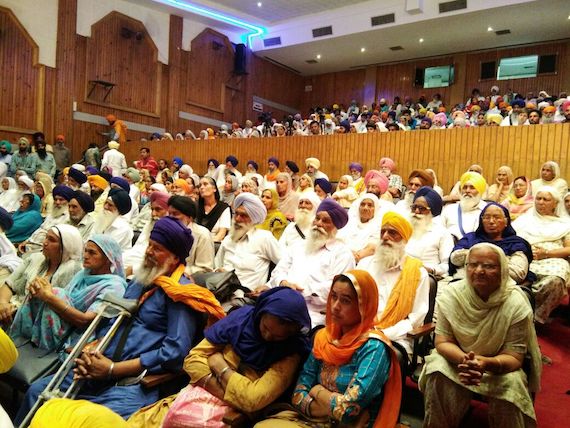
Family members of victims of enforced disappearances in Punjab attending the proceedings | Photo: Jasbir Singh
Our distinguished panel will critically examine the present state of affairs; examine the findings of the PDAP report of large scale human rights violations, hear direct testimony from affected victims (including those who have had no judicial recourse and those whose cases have been protracted or stayed for a period of over twenty years); the State’s responsibility under domestic and International law and finally, the enforceable right to justice; effective and adequate remedies including immediate compensatory relief.
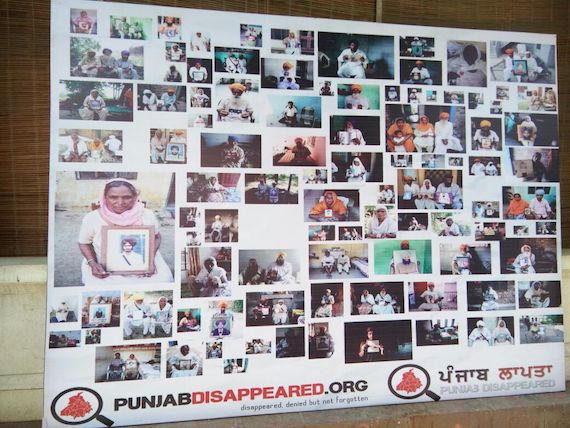
A hoarding placed by PunjabDisappeared.org | Photo: Jasbir Singh
Twenty-two years since the disappearance, abduction and killing of Sardar Jaswant Singh Khalra, a human rights activist who uncovered mass cremations of 2097 individuals, we return to Amritsar. The IPT will revisit and examine the fate of those 2097 “unclaimed and unidentified” disappeared in Amritsar’s three cremation grounds and other disappearances across Punjab share their expertise. Instead of learning the lessons of Punjab’s bitter experience similar patterns of gross human rights violations have been mirrored in other conflict states in India.
The IPT will hear Expert evidence from the leading human rights lawyers in Punjab of their own bitter experiences and long struggles for justice and accountability in Punjab.
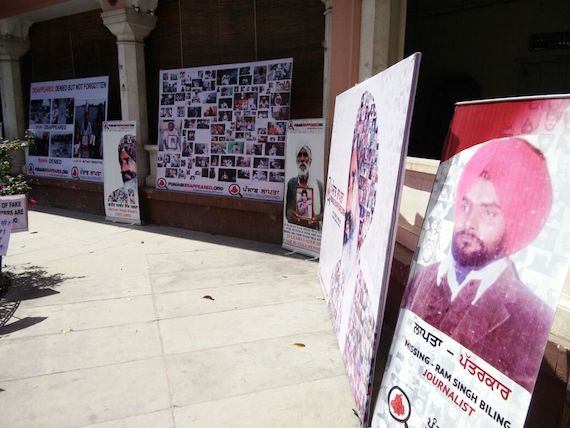
A view of hoardings placed by PunjabDisappeared.org | Photo: Jasbir Singh
Amar Singh Chahal (Advocate, Punjab & Haryana High Court Sikhs For Human Rights), Harshinder Singh (Advocate, Committee for Co-ordination on Disappearances in Punjab), Balbir Saini (Advocate, Worker’s Socialist Party), Jagjit Singh (Advocate, Batala), Rajwinder Singh Bains (Advocate, Punjab & Haryana High Court Punjab Human Rights Organisation), Gurtej Singh (Committee for Co-ordination on Disappearances in Punjab), Harpal Singh Cheema (Advocate, Sikhs For Human Rights), Satnam Singh Bains (Barrister and Advocate), Jagjit Singh (PDAP) and Baljinder Singh (PDAP) were also present during the proceedings of IPT as Expert Witnesses Panel.

Another view of hoardings placed by PunjabDisappeared.org | Photo: Jasbir Singh
“The IPT seeks to lay bare the endemic failures of the judicial process to investigate, prosecute, and hold to account those responsible for mass state violence. It will critically analyse the apathy and indifference of the Indian judiciary in perhaps the worst cases of mass state killings ever litigated in independent India. The “Punjab Mass Cremations Case” before the NHRC (National Human Rights Commission), remains one of the most protracted and unresolved cases in Indian legal history. The IPT will analyse why none of the miniscule number (around 30 cases out of 1513), investigated by the CBI have resulted in a single conviction and are themselves currently subject to judicial stays”, a statement PunjabDisappeared.Org reads.
“The IPT will consider why the NHRC has made no comment in a single case concerning the1513 identified cases, as to whether they were genuine encounter killings using legally sanctioned lethal force or whether they were extra-judicial killings (fake encounters). Whilst the NHRC has conducted high profile “fact findings” in other states in India, there has never been an NHRC led enquiry that has ever visited Punjab to investigate and consider the accuracy of thousands of police killings in so-called encounters”, it reads further.
The PDAP builds upon the considerable and ground breaking work done by the Committee for Co-ordination on Disappearances in Punjab, Human Rights Law Network, Sikhs for Human Rights, Khalra Mission Organisation the Punjab Human Rights Organisation, Lawyers for Human Rights International, Committee for Information and Initiative on Punjab, as well as many committed and tenacious Advocates, NGO’s and Activists.
The PDAP travelled to over 1400 villages in Punjab investigating thousands of cases and draws on seven years of documentation through corroboration with victim’s testimony, eyewitness accounts, records, data and evidence. It examines the patterns, which emerge in the litigation undertaken by human rights advocates and organisations in identifying what happened to thousands of victims, who ended up with the ignominious title “lawaris” and “unpechathi” (unclaimed and unidentified).
The PDAP has investigated and re-examined thousands of enforced disappearances and extrajudicial killings in Gurdaspur, Amritsar, Ferozepur and other affected areas.
A report will set out the preliminary findings in a number of these cases. A detailed set of findings will be presented, that the overwhelming majority of the NHRC 1513 cases in which the unidentified were identified, were the result of an enforced disappearances and extra- judicial killing. The report concludes by arguing that there remains a cogent and compelling case for on-going effective investigation in cases from all districts in Punjab.
In 2013, the UN Special Rapporteur on Extrajudicial, Summary, or Arbitrary Executions, Christof Heyns in his report presented to the UN Human Rights Council (UN HRC), noted that, ‘delay in judicial proceedings constitute one of India’s most serious challenges and has clear implications for accountability.”
With a specific reference to Punjab, he pointed out “lengthy and ineffective proceedings exist in Punjab where large-scale enforced disappearances and mass cremations occurred between the mid-1980s and 1990s. The lack of political will to address these disappearances is evident in a context where steps to ensure accountability have been reportedly inconclusive.”
The IPT will examine the disparate, inconsistent and flawed approach towards mass state crimes, when the Punjab experience is compared to similar conflicts in India. How the failure to provide justice or any meaningful post conflict resolution to this dark chapter in Punjab’s history is inextricably linked to Punjab’s present problems, and future.
The IPT aims to dispel the fear psychosis which shroud such discussions through critical analysis, meaningful discussion and a constructive approach as to what can be done through a distinguished panel of retired judges, human rights activists, lawyers, media and others who have advanced the cause of truth, justice and accountability.
The IPT is the latest step in a concerted effort to uncover the truth and for truth, justice, reconciliation and rehabilitation for the affected people of Punjab.
To Get Sikh Siyasat News Alerts via WhatsApp:
(1) Save Our WhatsApp Number 0091-855-606-7689 to your phone contacts; and
(2) Send us Your Name via WhatsApp. Click Here to Send WhatsApp Message Now.
Sikh Siyasat is on Telegram Now. Subscribe to our Telegram Channel
Related Topics: Advocate Amar Singh Chahal, Advocate Rajwinder Singh Bains, Association of Parents of Disappeared Persons, Association of Parents of Disappeared Persons (APDP), Bhai Harpal Singh Cheema, Bibi Paramjeet Kaur Khalra, Human Rights Law Network (HRLN), Independent People's Tribunal (IPT), Khalra Mission Organization, PunjabDisappeared.Org




